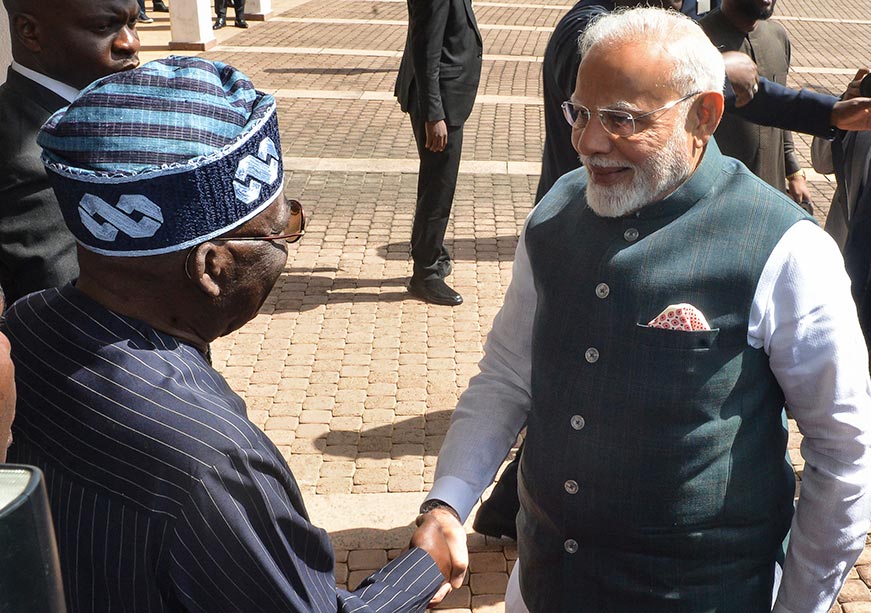-
CENTRES
Progammes & Centres
Location
Defence has emerged as a key area of cooperation between India and African nations

Image Source: Getty
The year 2024 concluded with Prime Minister Narendra Modi’s historic visit to Nigeria, a tour marking a significant milestone in India-Africa relations for multiple reasons. This was the first visit by any Indian Prime Minister to Nigeria in 17 years; this was also Modi’s first Africa visit since he was reelected in May 2024. During his first two terms, Modi travelled to 10 African countries, including Uganda, where he delivered a landmark speech outlining India’s vision of Africa. Furthermore, during his trip to Nigeria, he was conferred the second-highest national award of Nigeria, the ‘Grand Commander of the Order of the Niger’, making him only the second foreign dignitary to be conferred the award after the British Queen Victoria (in 1969).
Modi’s trip was also a follow-up to an Indian defence industry delegation’s visit to Lagos earlier last year. During his interaction with that defence delegation, Nigerian President Bola Ahmed Tinubu had expressed interest in buying arms from India. In September 2023, during India’s historic G20 Presidency, the Nigerian President was specially invited by Modi in India to attend the Group of 20 (G20) Summit in New Delhi. During that Summit, Tinubu announced that Nigeria had approved the finalisation of a new $1 billion defence deal with India, expressing its interest in the purchase of the Indian Light Combat Aircraft (LCA) Tejas, drones, and armoured personnel carriers.
Modi’s trip was also a follow-up to an Indian defence industry delegation’s visit to Lagos earlier last year.
India’s Defence Research and Development Organisation (DRDO) already had an MoU with Nigeria’s Defence Research and Development Bureau (DRDB) to cooperate in Defence R&D. During the Summit, the Indian Ministry of Defence advanced this cooperation with the Defence Corporation of Nigeria (DICON) by signing an agreement where the Indian Ministry of Defence would assist DICON in becoming 40% self-sufficient in the production of military hardware by 2027. Going forward, many countries of the Global South, particularly from Africa, are expected to follow Nigeria’s path.
India is emerging as a key defence supplier to Africa, with sales to Egypt, Algeria, Morocco, Tanzania, and Mozambique. To give the sector its due importance, since February 2020, India has been organising the India-Africa Defence Ministers’ Conference (IADMC) on the sidelines of the DefExpo military exhibition. India’s Ministry of Defence has also set a goal of $ 5 billion of defence exports by 2025. And this is unachievable without scaling up its export to Africa. India has always played an essential role in Africa’s security, being a key contributor to peacekeeping operations. As a first, India is set to deploy defence attaches in several African countries, including Djibouti, Ethiopia, Ivory Coast, Mozambique, and Tanzania. The PM’s visit will accelerate India’s defence cooperation with Africa.
Last year, another important event of public diplomacy took place, in January, when Indian External Affairs Minister S Jaishankar attended the Non-Aligned Movement (NAM) conference in Uganda, marking the importance India accords to NAM as an institution. While multiple countries are jostling over the Global South leadership driven by narrow national interest, India’s approach to Africa as an equal and, more importantly, intervention at the grassroots level makes it distinct from the others.
India is set to deploy defence attaches in several African countries, including Djibouti, Ethiopia, Ivory Coast, Mozambique, and Tanzania.
In February 2024, Modi and his Mauritian counterpart, Pravind Jugnauth, jointly inaugurated an airstrip and jetty on the Mauritian archipelago of Agaléga. This and six more India-assisted development projects in Mauritius are part of India’s Security and Growth for All (Sagar) policy. In addition to enhancing India’s maritime ties with the region, the infrastructure also underlines India’s growing importance as a security actor in the Western Indian Ocean Region.
2024 was the year of elections in India, the USA and several African countries. The year was also marked by war and violence in different parts of the world. In Africa, two military generals of Sudan continued to fight for the throne, killing more than 200,000 people and displacing two million. Despite these disruptions, India and Africa managed to advance their engagement. The year 2025 will be pivotal for India-Africa relations. As global turbulences continue, a robust India-Africa partnership will be crucial to raise the issues of the Global South. During and after India’s G20 presidency, India hosted three editions of the Voice of the Global South Summit (VOGSS), in which all African countries participated. However, VOGSS is only virtual. Moreover, it includes all Global South countries, thereby reducing Africa’s importance. As the dust of disruptions is expected to settle across the world, it is time to revive the India-Africa Forum Summit (IAFS) by organising its much-awaited 4th iteration.
This commentary originally appeared in Deccan Herald.
The views expressed above belong to the author(s). ORF research and analyses now available on Telegram! Click here to access our curated content — blogs, longforms and interviews.

Samir Bhattacharya is an Associate Fellow at ORF where he works on geopolitics with particular reference to Africa in the changing global order. He has a ...
Read More +